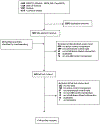Overall and Differential Attrition in Mindfulness-Based Interventions: A Meta-Analysis
- PMID: 36506616
- PMCID: PMC9728563
- DOI: 10.1007/s12671-022-01970-z
Overall and Differential Attrition in Mindfulness-Based Interventions: A Meta-Analysis
Abstract
Objectives: Attrition is very common in longitudinal research, including randomized controlled trials (RCTs) testing psychological interventions. Establishing rates and predictors of attrition in mindfulness-based interventions (MBIs) can assist clinical trialists and intervention developers. Differential attrition in RCTs that compared MBIs with structure and intensity matched active control conditions also provides an objective metric of relative treatment acceptability.
Methods: We aimed to evaluate rates and predictors of overall and differential attrition in RCTs of MBIs compared with matched active control conditions. Attrition was operationalized as loss to follow-up at post-test. Six online databases were searched.
Results: Across 114 studies (n = 11,288), weighted mean attrition rate was 19.1% (95% CI [.16, .22]) in MBIs and 18.6% ([.16, .21]) in control conditions. In the primary model, no significant difference was found in attrition between MBIs and controls (i.e., differential attrition; odds ratio [OR] = 1.05, [0.92, 1.19]). However, in sensitivity analyses with trim-and-fill adjustment, without outliers, and when using different estimation methods (Peto and Mantel-Haenszel), MBIs yielded slightly higher attrition (ORs = 1.10 to 1.25, ps < .050). Despite testing numerous moderators of overall and differential attrition, very few significant predictors emerged.
Conclusions: Results support efforts to increase the acceptability of MBIs, active controls, and/or RCTs, and highlight the possibility that for some individuals, MBIs may be less acceptable than alternative interventions. Further research including individual patient data meta-analysis is warranted to identify predictors of attrition and to characterize instances where MBIs may or may not be recommended. Meta-Analysis Review Registration: Open Science Framework (https://osf.io/c3u7a/).
Keywords: attrition; differential attrition; meta-analysis; mindfulness-based interventions; treatment acceptability.
Figures


References
-
- Alfonsson S, Olsson E, & Hursti T (2016). Motivation and treatment credibility predicts dropout, treatment adherence, and clinical outcomes in an internet-based cognitive behavioral relaxation program: A randomized controlled trial. Journal of Medical Internet Research, 18(3), e52. 10.2196/jmir.5352 - DOI - PMC - PubMed
Grants and funding
LinkOut - more resources
Full Text Sources
